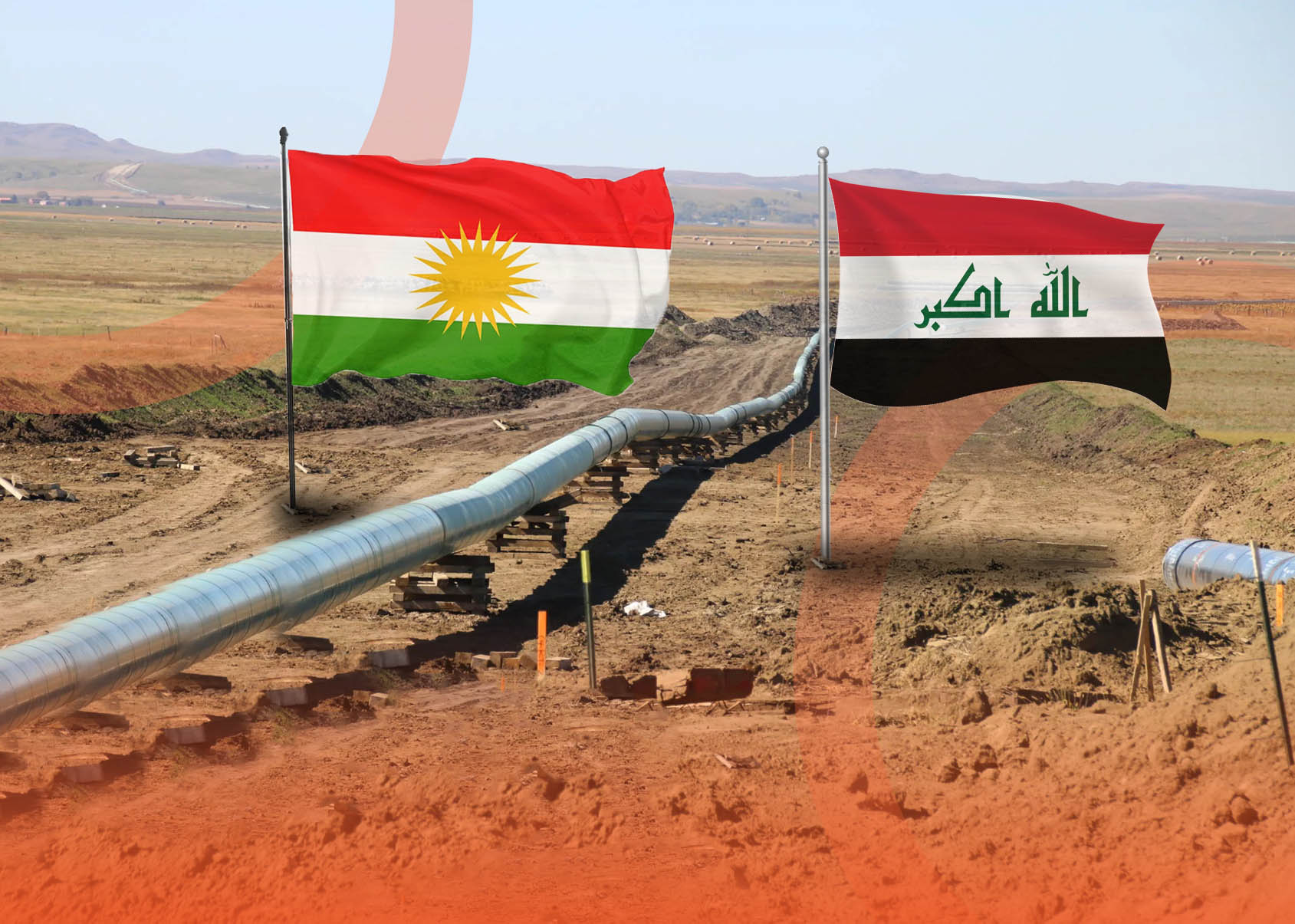Introduction
The protracted disagreement over oil exports between the Kurdistan Region and Baghdad has endured for over a decade, with both entities firmly resisting compromise. However, contemporary external circumstances have come into play, culminating in a pivotal court decision. This article probes both the internal and external influences that have fueled this strife.
Fueling Interests: The Global Impact of Kurdistan's Oil Dispute
Prior to the announcement of the court's ruling, the Elysee Palace hosted officials from both Baghdad and Erbil, which included the prime ministers of Iraq and the Kurdistan region. It's extremely unlikely that energy matters and the impending court decision were not discussed during this critical meeting. Importantly, two of Kurdistan's main oil buyers are from European nations. Given Europe's current focus on the ongoing conflict in Ukraine and with France preparing to invest billions of dollars in Iraq, maintaining stable diplomatic ties between Baghdad and Erbil is of paramount significance for Europe.
The world still relies on oil, and as the leading global power, the United States supports oil exports from the Kurdistan region. Reports indicate that White House officials have been negotiating with relevant parties to resolve the issue. Beyond energy, there are geopolitical and security dimensions to this issue for the United States. The Kurdistan region serves as an essential logistics and command hub for US operations in Syria and the West. Thus, any shift in the power balance between the Kurdistan Region and Baghdad, at least for now, would be unfavorable to the United States.
Following a recent spike in tensions in Syria, the United States announced the extension of its warships' mission near Greek waters, readying for potential emergencies in the Middle East. Although escalating the Syrian conflict into a full-scale war may be challenging, General Mark Milley has underscored the importance of understanding the regional balance of power, especially given the growing partnerships between Russia, China, and Iran. This highlights the importance of US allies, including the Kurdistan region, in the Middle East.
In recent years, the United States has experienced conflicts with several allies, including Turkey, Israel, Saudi Arabia, and the Kurdistan region, over human rights and democracy issues, but its focus has been increasingly shifting toward geopolitics. The US did not wish the recent helicopter crash in the Kurdistan region to cause significant controversy. Washington might have been displeased with Erbil's response to the State Department's report on the degradation of human rights in Iraq and the Kurdistan region, as well as the republication of an article about the KRG by the US consul.
Moreover, the US conflict with China and Russia is a crucial factor. Russian President Vladimir Putin recently introduced a draft policy opposing the West and appears resolute in building relations with US adversaries. Russia's Foreign Minister now has his sights set on the Middle East and is unlikely to applaud US policies in the region during his anticipated debate in the Security Council.
This year, several US and Western officials, including the US Secretary of Defense who visited Erbil and the Munich Security Conference, met with the President of the Kurdistan Region, and the meetings with Western officials have been prominent. Interestingly, Lavrov visited Iraq in February this year without stopping in Erbil, and Russia's special envoy for Middle East and African affairs, Mikhail Bogdanov, is expected to do the same unless plans change.
Following the 2017 referendum, when the Turkish President threatened to cut off oil supplies, Aleksander Dugin, a Eurasian scholar who previously visited the Rudaw Research Center for a seminar, conveyed that the Kremlin would not approve such action. Despite the perception of Erbil leaning more pro-American, it doesn't seem advantageous for Russia to halt oil exports, as their companies could potentially suffer substantial losses. Iraq's stance on this is still unclear.
Furthermore, the US conflict with China and Russia influences this dispute as well. China, as one of Saudi Arabia's largest oil buyers (14%), and having signed a 25-year agreement with Tehran, successfully brokered a deal between the two countries. While this could be beneficial to the United States in areas like the war in Yemen, it poses a challenge in terms of power dynamics, making it difficult for Washington to take advantage. Therefore, the agreement between Erbil and Baghdad on the draft budget law, which includes an energy agreement, enjoys the support of the United States.
However, the worsening of relations between Erbil and Baghdad over oil, a matter the United States has long advocated for, could prove damaging for Washington.
For Turkey, the issue involves both international politics and domestic factors. Although geographical considerations make it impossible for the Kurdistan Region to export oil without Turkey's involvement, those who argue that Turkey adjusted its energy policy in the Kurdistan region for strategic interests, such as the overland canal project linking the Gulf and Turkey, may not fully capture the situation. Turkey continues to send oil to the Kurdistan Region, and the project is not near completion.
As crucial elections approach, it was difficult for Erdogan to press the issue of oil in the Kurdistan region without giving rival factions a potent tool. It appears the AKP has little hope of securing the Kurdish vote this time around. Thus, igniting a dispute with Iraq over "Kurds" at a time when his opponents are utilizing nationalist, leftist, and conservative narratives was not a viable option for a pragmatic politician like Erdogan. While the game of alliances and electoral engineering is not over yet, the PKK and Ocalan have not yet issued their final statement.
The HDP-YSP seems eager to avert a hypothetical settlement with Erdogan, as it did in Turkey, a victim of the halt in Kurdistan's oil exports. Despite the constraints of the domestic political situation, this doesn't imply they don't seek a resolution between Erbil and Baghdad behind the scenes.
Uncovering the Motives behind Erbil-Baghdad Settlement
For an extended period, the Kurdistan Region and Baghdad have been unable to fully align their stances, largely due to internal Kurdish divisions. The intricacies of the relationship between the Patriotic Union of Kurdistan and the KDP, coupled with the economic strain of halting oil exports, may incite internal unrest. As parliamentary elections loom later this year, the suspension of oil exports could significantly shift the internal power dynamics within the Kurdistan Region.
In the wake of the International Criminal Court's decision, the Iraqi prime minister had a chance to placate certain Shiite parties by working towards their demands for controlling the Kurdistan Region's energy resources, without causing damage. While there was a notable push towards an agreement between Erbil and Baghdad regarding the budget and oil and gas laws, the halting of Kurdistan’s oil post-ICC decision highlighted that the issue extends beyond oil disputes. Together, these events signify a new phase in Erbil-Baghdad relations, marking two decades post-2003 war. At this juncture, the Kurdistan region is at a crossroads, while Iraq has yet to fully evolve into the federal state envisioned in the constitution.
The support of the Kurdish faction for al-Sudani's government is currently of paramount importance. With the Sunnis growing increasingly concerned about unfulfilled pre-government formation promises and potential internal Shiite conflict looming, this support is critical. Additionally, the Kurds' relationships with foreign powers, particularly the West, can occasionally bolster al-Sudani's government. Al-Sudani recognizes that many nations, even those not endorsing Kurdish independence, view the Kurdistan Region as a balancing factor in their Iraq policies. Over the past year, Iran has posed security threats to the Kurdistan Region for border security reasons, and recently entered into an agreement with Iraq for border protection. In essence, Tehran sees value in reigniting Kurdish and Sunni issues in Iraq.
Another issue to consider is that if Kurdistan's energy disputes are legally resolved, the Iraqi Prime Minister will need to address the growing concerns and discourse around oil smuggling in southern Iraq and other regions. This could open a Pandora's box of new challenges involving armed gangs, something the Prime Minister may not be equipped to handle, especially considering the current instability of the government.
In dealing with the Kurdistan Region's oil predicament, the Baghdad government has leaned on constitutional articles, such as Article 130, permitting the enforcement of prior, non-repealed, or non-amended laws. In contrast, the Kurdistan Region has invoked other constitutional articles, like 112, 113, and 115, to uphold its oil and gas rights. Regardless of these legal frameworks, the key determinant in this issue will be the relative power dynamics among the parties involved.
The suspension of oil supplies to the Kurdistan Region, or any escalation of Erbil-Baghdad tensions over oil, seemingly contradicts the interests of major global players like the United States, Russia, Turkey, and Europe, especially considering the current political landscape in Iraq and the Kurdistan Region. Therefore, a solution that benefits all parties is vital to resolving the crisis of the suspended oil exports from the Kurdistan Region, at least in the interim.
Get closer & follow us on Twitter






